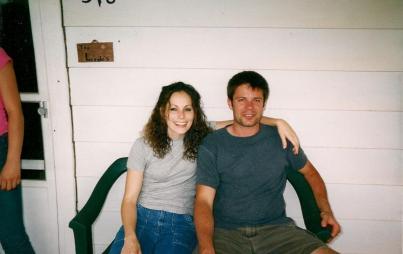
CN: Infant and Pregnancy Loss
In a few months, we will celebrate my daughter Jordan’s 25th birthday. We’ll also be honoring her death day. If her birthday weren’t also her death day, she’d probably be done with college by now. She’d be off to grad school or to get her Ph.D. Maybe she’d be getting married soon or planning how many grandchildren she and her partner were going to bless me with. I like to imagine we’d still be close, the way her sister, Kelsey, and I are. I imagine she’d have shoulder-length silky brown hair and hazel eyes, the kind that look green some days and brown on others, also like her sister, because I can’t imagine she’d look any other way. She’d probably be, like all of her siblings, kind. She’d probably be a smart and compassionate and beautiful human being.
I imagine her now. I don’t necessarily believe she’s waiting for me in heaven, because I don’t necessarily believe in heaven. I do believe that there are pieces of her, the molecules that were her, and every other person I’ve ever know and loved and lost, all around me.
When she died, I died. Not literally, of course, but a part of my heart went with her to wherever she ended up. In the devastating wake of her death, people said many things to me that were not only unhelpful, but profoundly painful.
Things like:
Don’t worry, you’ll have more kids.
At least you’re young.
Someone else needed her spirit.
At least you lost her before full term.
Maybe she wasn’t meant for you.
These hurt. They cut me over and over, digging the wound of her loss deeper and deeper until I thought it might dig my heart right out. Even the sentiment “You’ll be okay” hurt. There was no segment of my brain, not even a sliver, that felt like I’d be okay. I felt like I’d never be okay again.
I’ve shared this list with you before because I think it’s helpful to know what things seem supportive but can actually be hurtful. I think it’s also helpful for people who have never experienced this loss to know that silence is painful, too. Sometimes when people don’t know what to say, they opt for nothing, pretending that everything is just as it was before, negating their life, and in that way, negating them.
You Might Also Like: Pregnancy And Infant Loss Remembrance Day
In that spirit, I’d love to give you a list of things that are helpful — words that affirm, words that see the mother and family in their pain and meet them there.
1. I’m sorry you lost your baby.
"I'm sorry" is great. "I'm sorry you lost your baby" is great, with a side of "this is real." If you say nothing else, say this. A simple “I am so sorry” says that you care. You see the pain, You honor it. If this is all you can say, just say this.
2. I am here — however you need me.
If you have the emotional space to be there, be there. Maybe they need you to take their other children or cook a meal. Maybe their kitchen sink needs a good shining or their carpet is covered in dog hair. Maybe they need you to hold them. Maybe they are not okay; let them know it’s okay to not be okay.
3. Your feelings are valid.
I remember when my dear friend lost her baby. She wasn’t very far along in her pregnancy, which often makes people feel like they have less of a right or reason to grieve. The baby never had a visible heartbeat. It never grew past that first precious jellybean. Why would she deserve to weep? Why when other women suffer such great loss?
I felt this way for many years after Jordan died. I dared not speak her name because I thought she wasn’t worthy of a name. She’d never taken a breath. She died inside of me. I was 21 weeks pregnant, but she was only measured 16 weeks. I didn’t hold her in my arms. I didn’t see her, her tiny face, her developing features, her long fingers, her little toes. She was taken from my body and thrown away with the medical waste. I cringe even to speak it. I followed my doctor's recommendation and was asleep for the surgery that took her from me.
I felt I had no right to call her my daughter.
I am here to tell you that every baby is real. A baby that’s implanted in a fallopian tube. A baby that’s actually not a baby at all, but a rapidly dividing group of irregular cells. A baby with no heartbeat ever. Every baby is a baby and every parent needs and deserves the space to grieve their baby — whether it’s a week or 25 years.
I laid with that friend of mine on her bed and held her as she wept. I have never felt more privileged to be present for a person who needed someone just to be present. She needed to know that the baby was real. She needed someone to tell her it was okay to feel broken beyond repair.
4. I love you.
If you feel it, say it. I think we don’t say “I love you” nearly enough. If you love them, tell them so. There is never too much love.
5. If they have given them one, I’d like to remember their baby by their name.
Nothing says “Your child was real” like calling them by their names. Say their names.
My friend Mandy lost her 19-month-old son Rory.
Saying Rory was real and wonderful and loved might be painful for her but is honors that he was here. It honors her.
It is sometimes hard an painful and uncomfortable to be around someone who has lost a child. But your presence, your empathy matters. By giving them, you tell the people in pain that they matter, too.







